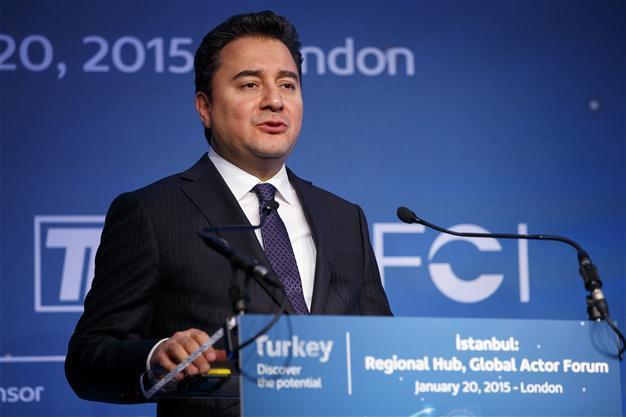Turkey a ‘net winner’ from low oil prices: Deputy PM Babacan
ANKARA / DAVOS – Anadolu Agency

Deputy Prime Minister Ali Babacan speaks at the World Economic Forum in Davos, Jan. 22. AA Photo
Turkey is a net winner from the decline in oil prices, said Deputy Prime Minister Ali Babacan, speaking at the World Economic Forum in Davos on Jan. 22.“Our biggest gain from low oil prices is the improvement in our current account balance,” Babacan said, adding that the decline may have a slight negative effect on collecting tax revenues from petroleum products.
“We forecasted approximately a 4 percent growth rate for 2015, but when we made this forecast, oil prices were expected to be higher. We are prepared for all types of consequences from the lower oil prices,” he said.
“If oil prices remain low, Turkey's inflation rate could fall to around 5 percent and it would not be a surprise,” Babacan said.
“We have not yet revised this rate officially. Before making a final decision, we have to observe prices longer and talk to actors in the market,” he added.
Oil prices have fallen almost 60 percent in the last seven months, their sharpest drop since 2008, due to oversupply and low oil demand in world markets.
Turkey brought in $56 billion in energy imports in 2013, and $37 billion in the first eight months of 2014, according to the Turkish Statistical Institute (TÜİK).
Babacan said the oil price slump hurts Russia’s economy, and Russia is one of Turkey’s biggest trade partners.
“There could be some decrease in Turkish exports to Russia or in the spending of Russian tourists in Turkey,” he said.
“Export numbers may prove a little lower than our expectations, but since the prices of petroleum products have also decreased, Turkey’s current account balance will improve,” said Babacan.
“2015 will be a better year for Turkey than 2014, not only because oil prices are falling, but also because our policies are working,” he said.
Speaking in Davos, Babacan also touched on Turkey's term presidency this year of the G-20.
“We do not want to limit the G20 to its members, but we want to be inclusive about the issues of other countries outside the group, which total one-third of the world’s population,” he said.
“We want to create a mechanism this year to monitor countries’ reform commitments. We are working in close cooperation with the IMF, the OECD and the World Bank,” he added.
















